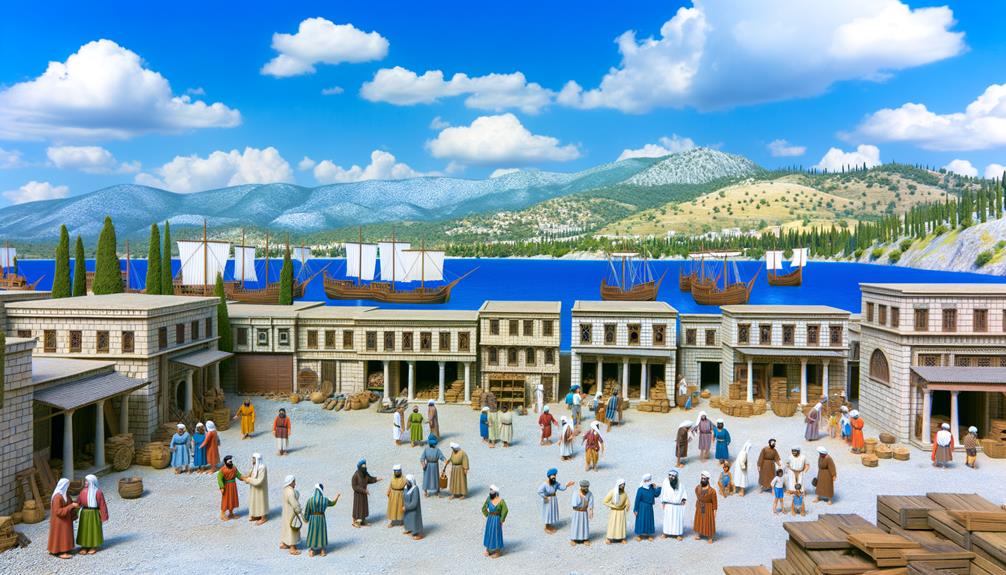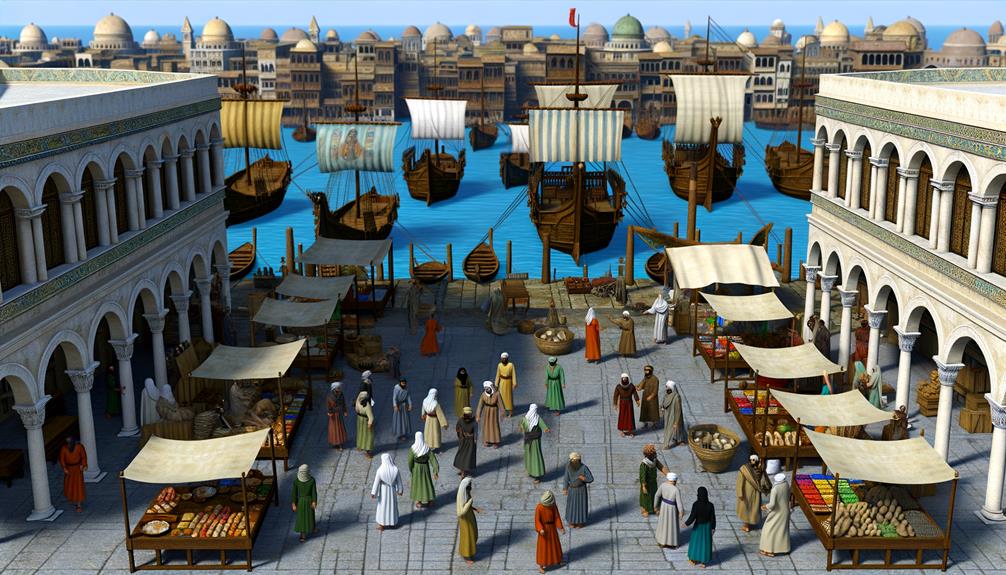Joppa Meaning In The Bible: Port of Divine Encounters
Joppa, an ancient port city on the Mediterranean coast, is pivotal in biblical narratives due to its strategic and symbolic significance. Mentioned in both the Old and New Scriptures, it was the port through which cedars from Lebanon were transported for Solomon’s Temple (2 Chronicles 2:16) and from where Jonah attempted to flee from God’s command (Jonah 1:3).
In the New Scriptures, Joppa is the setting for Peter’s vision, which radically expanded early Christian outreach to Gentiles (Acts 10). This city’s rich historical and theological layers highlight its integral role in biblical events.
Insights from archaeological findings continue to elucidate its complex past.

Key Takeaways
- Joppa was a significant port for transporting cedars for Solomon’s Temple, symbolizing resource provision (2 Chronicles 2:16).
- It marked Jonah’s departure in his attempt to flee from God, highlighting themes of disobedience and divine intervention (Book of Jonah).
- Peter’s resurrection of Tabitha in Joppa demonstrated divine power and revived faith within the early Christian community (Acts 9:36-42).
- Peter’s vision in Joppa emphasized the inclusion of Gentiles, transforming early Christian theology regarding clean and unclean distinctions (Acts 10).
Joppa Meaning in the Bible: Port City of Divine Encounters and Missions
| Aspect | Details |
|---|---|
| Name | Joppa (also called Jaffa) |
| Meaning | Beauty or lovely (possible Hebrew root “Yaffe”) |
| Biblical References | Jonah 1:3, Acts 9:36–43, Acts 10 |
| Geographic Role | Ancient seaport on the Mediterranean Sea |
| Key Events | Jonah fled from God; Peter raised Tabitha; vision of clean/unclean |
| Spiritual Symbolism | Obedience, transformation, gateway to mission |
| Modern Relevance | Located in modern-day Tel Aviv–Yafo, Israel |
Historical Background of Joppa

Situated on the Mediterranean coast, the ancient city of Joppa (modern-day Jaffa) holds significant historical importance, serving as a prominent port and cultural crossroads in biblical times.
Archaeological evidence indicates that Joppa was inhabited as early as 7500 BCE, making it one of the oldest functioning harbors in the world. Its strategic location facilitated maritime trade and cultural exchanges between Egypt, Phoenicia, and Mesopotamia, fostering a vibrant, cosmopolitan environment.
Through various periods of conquest, including domination by Egyptians, Canaanites, and later Philistines, Joppa retained its economic and strategic value. Its robust fortifications and natural harbor made it a coveted asset for ancient empires, further underscoring its enduring significance in the ancient Near Eastern geopolitical landscape.
Joppa in the Old Testament

In the Old Scripture, Joppa’s prominence is highlighted through various narratives that underscore its role as a vital maritime gateway and a strategic locale for significant biblical events. Joppa, known today as Jaffa, served as an essential port for ancient Israel.
Its significance is evident in accounts such as the transportation of cedars from Lebanon for Solomon’s Temple (2 Chronicles 2:16). Additionally, Joppa’s strategic importance is illustrated in its mention within the context of territorial assignments and tribal inheritances.
| Biblical Event | Scripture Reference | Significance |
|---|---|---|
| Cedar Transport for Temple | 2 Chronicles 2:16 | Facilitated construction of temple |
| Tribal Inheritance | Joshua 19:46 | Defined Danite territory |
| Maritime Gateway | Various References | Key port for ancient Israel |
Thus, Joppa’s multifaceted role in the Old Scriptures underscores its enduring significance.
Jonah’s Journey From Joppa

Setting out from the port city of Joppa, the prophet Jonah’s journey as described in the Book of Jonah exemplifies a significant moment of divine intervention and prophetic mission within the biblical narrative.
Jonah’s initial attempt to flee from God’s command to go to Nineveh underscores the human tendency to resist divine will.
Boarding a ship bound for Tarshish, Jonah’s departure from Joppa marks a pivotal act of disobedience, catalyzing a series of miraculous events.
The ensuing storm and Jonah’s subsequent encounter with the great fish serve as expressions of divine authority and mercy.
Joppa’s role as the starting point of Jonah’s reluctant mission highlights its importance as a geographic and symbolic location within the scriptural context.
Joppa in the New Testament

While Joppa played a significant role in the Old Scripture narrative of Jonah, its prominence extends into the New Scripture, where it becomes a focal point for pivotal events in the early Christian Church.
This ancient port city, known today as Jaffa, serves as a backdrop for several key incidents in the Acts of the Apostles:
- Tabitha’s Resurrection: Peter raises Tabitha (Dorcas) from the dead, showcasing divine power and compassion.
- Peter’s Stay: Peter lodges with Simon the Tanner, indicating the city’s hospitable nature.
- Missionary Activity: Joppa acts as a strategic location for spreading the gospel.
- Gentile Inclusion: The city symbolizes the expanding reach of Christianity to Gentiles.
These events underscore Joppa’s critical role in early Christian narratives.
Peter’s Vision in Joppa

Peter’s vision in Joppa, a profound and transformative revelation, greatly altered the course of early Christian theology by challenging prevailing Jewish dietary laws and heralding the inclusion of Gentiles into the faith.
This pivotal event, recorded in Acts 10, occurred while Peter was praying on a rooftop. He saw a sheet descending from heaven, filled with various animals deemed unclean by Jewish law. A divine voice instructed him to ‘kill and eat,’ which Peter initially resisted, citing his adherence to dietary restrictions.
The vision’s repetition emphasized its significance. Peter eventually understood that God was abolishing the distinction between clean and unclean, symbolizing the acceptance of Gentiles.
This revelation was instrumental in shaping the inclusive nature of the burgeoning Christian community.
The Raising of Tabitha

The account of Tabitha’s miraculous revival in Acts 9:36-42 serves as a vital example of Peter’s divine intervention, which greatly impacted the early Christian community in Joppa.
This event not only demonstrated Peter’s apostolic authority but also played an essential role in restoring the faith and unity of the local believers.
Analyzing this narrative highlights the theological and communal implications of resurrection miracles within the context of early Christian ministry.
Tabitha’s Miraculous Revival
Situated in the town of Joppa, the account of Tabitha’s miraculous revival by the Apostle Peter is a significant witness to early Christian miracles and the profound impact of faith in the nascent Church. This narrative, found in Acts 9:36-42, underscores several key elements:
- Tabitha’s Devotion: Known for her good works and acts of charity.
- Community Impact: Her death profoundly affected the local believers.
- Peter’s Prayer: Emphasizes reliance on divine power.
- Miracle’s Effect: Led many in Joppa to believe in the Lord.
Analyzing these elements provides deeper insight into the early Church’s dynamics and the role of miracles in fostering communal faith.
Peter’s Divine Intervention
In a profound demonstration of divine authority, Peter’s intervention in raising Tabitha from the dead serves as a pivotal proof to the transformative power of faith within the early Christian community.
This miraculous event, as chronicled in Acts 9:36-42, illuminates the theological implications of divine intervention through apostolic acts. The narrative not only underscores Peter’s role as a conduit of divine power but also reinforces the burgeoning Christian belief in resurrection and life beyond death.
| Aspect | Description |
|---|---|
| Miracle Location | Joppa (modern-day Jaffa) |
| Key Figure | Peter |
| Recipient of Miracle | Tabitha (also known as Dorcas) |
| Scriptural Reference | Acts 9:36-42 |
| Theological Significance | Demonstrates the power of faith and apostolic authority |
This event considerably contributes to the understanding of early Christian miracles.
Community’s Faith Restored
Widely regarded as a demonstration of the revitalizing power of faith, the raising of Tabitha in Joppa rejuvenated the early Christian community’s belief in divine miracles and reinforced their collective spiritual resolve. This event, chronicled in Acts 9:36-42, illustrates the profound impact of Peter’s intervention on the community.
Tabitha, also known as Dorcas, was a beloved disciple known for her charitable deeds. Her resurrection from the dead served as a pivotal moment, catalyzing both spiritual renewal and communal solidarity.
Key aspects include:
- Revival of faith in divine intervention
- Strengthening of communal bonds
- Reaffirmation of Peter’s apostolic authority
- Increased conversion rates
This miracle underscored the tangible influence of faith in the early Christian era.
Joppa’s Role in Trade

Joppa, strategically situated on the Mediterranean coast, served as an essential nexus in ancient trade routes, facilitating the exchange of goods throughout the region.
The port of Joppa was instrumental in the importation and exportation of various commodities mentioned in biblical texts, such as timber from Lebanon for Solomon’s temple.
This role underscores Joppa’s significance not only in economic terms but also in its contribution to the cultural and religious fabric of the ancient Near East.
Ancient Trade Routes
Strategically situated along the Mediterranean coast, Joppa emerged as a pivotal node in ancient trade networks, facilitating the exchange of goods and culture between diverse civilizations. Its geographic position made it an essential waypoint for maritime and overland trade routes, enhancing its economic and cultural significance.
Key aspects of Joppa’s role in ancient trade routes include:
- Maritime Access: Direct access to Mediterranean sea routes.
- Overland Connectivity: Links to major inland trade paths.
- Cultural Exchange: A melting pot for various cultural influences.
- Economic Hub: Center for trade in commodities such as spices, textiles, and precious metals.
Joppa’s strategic location underpinned its enduring legacy in ancient trade.
Port of Joppa
A pivotal factor in Joppa’s prominence within ancient trade networks was its well-established port, which served as an essential gateway for maritime commerce.
Strategically situated along the Mediterranean coastline, the Port of Joppa facilitated the movement of goods between various civilizations, enhancing its role as a vital node in regional trade.
The natural harbor provided safe anchorage for vessels, while its proximity to major land routes enabled efficient overland transportation.
This connectivity allowed Joppa to thrive as a bustling marketplace, where merchants from diverse regions converged.
Its significance is underscored in historical texts, indicating the port’s pivotal role in the economic and cultural exchanges that shaped the ancient Near East.
Biblical Trade Goods
Trade goods mentioned in biblical texts highlight Joppa’s integral role as a conduit for the exchange of valuable commodities such as timber, spices, and precious metals.
Joppa, a strategically located port, facilitated the flow of essential resources for ancient civilizations, particularly those within Israel. Analyzing biblical references elucidates its significance in trade networks.
Key trade goods associated with Joppa include:
- Timber: Remarkably cedar from Lebanon, vital for constructing Solomon’s Temple.
- Spices: Essential for religious rituals and daily life.
- Precious metals: Including gold, often imported for temple adornments.
- Ivory: Used in crafting luxury items and furnishings.
Joppa’s pivotal role in these exchanges underscores its importance in biblical history and economy.
Symbolism of Joppa

How does the ancient port city of Joppa serve as a potent symbol in biblical narratives, representing themes of transformation, divine intervention, and cross-cultural connections?
Joppa, now modern-day Jaffa, is a site of pivotal scriptural events. Its role in the story of Jonah underscores divine intervention, where Jonah’s attempt to flee from God’s command leads to his transformative journey inside a whale.
Similarly, in Acts 10, the vision of Peter in Joppa epitomizes cross-cultural connections, as it heralds the acceptance of Gentiles into early Christianity.
These narratives collectively highlight Joppa as a locus where divine plans unfold, human lives are transformed, and cultural barriers are transcended, reinforcing its symbolic significance in biblical literature.
Archaeological Findings in Joppa

Archaeological excavations in Joppa have uncovered a plethora of ancient artifacts, providing tangible evidence of its historical and cultural significance.
Items such as pottery, inscriptions, and architectural remnants offer insights into the city’s role during biblical times, revealing aspects of daily life, trade, and religious practices.
These findings underscore Joppa’s importance as a focal point of interaction between various civilizations throughout history.
Ancient Artifacts Unearthed
Recent excavations in Joppa have revealed a wealth of ancient artifacts that provide valuable insights into the city’s historical and cultural significance. These findings illuminate various aspects of life in this ancient port city, contributing considerably to our understanding of its past.
- Pottery shards: These fragments offer clues to the daily life and trade practices.
- Coins: Currency from different periods signifies economic exchanges and political influences.
- Inscriptions: Textual artifacts provide linguistic and historical context.
- Architectural remnants: Foundations and structures reveal construction techniques and urban planning.
These discoveries collectively enhance our comprehension of Joppa’s multifaceted role in antiquity.
Historical Significance Revealed
The myriad of archaeological findings in Joppa has significantly revealed the historical importance of this ancient port city, offering an extensive understanding of its pivotal role in regional trade, politics, and daily life.
Excavations have unearthed a variety of artifacts, including pottery, inscriptions, and architectural remnants, each contributing to the narrative of Joppa’s significance. Key discoveries include Phoenician inscriptions indicating robust maritime trade networks, Egyptian scarabs suggesting political alliances, and domestic tools reflecting everyday life.
| Artifact Type | Key Findings | Historical Implication |
|---|---|---|
| Pottery | Storage jars, amphorae | Trade and storage practices |
| Inscriptions | Phoenician, Egyptian texts | Trade routes, political influence |
| Architectural Remains | City walls, dwellings | Urban planning, defense |
| Domestic Tools | Utensils, weaving tools | Daily life, economic activities |
These findings collectively underscore Joppa’s multifaceted role in antiquity.
Joppa’s Spiritual Significance

Joppa’s spiritual significance in biblical literature is underscored by its frequent association with divine interventions and pivotal prophetic missions. This ancient port city serves as a backdrop for several key biblical narratives that highlight its spiritual importance:
- Jonah’s Flight: Joppa is where Jonah attempts to flee from God’s command, showcasing divine pursuit.
- Peter’s Vision: In Acts, Peter receives a transformative vision in Joppa, leading to the Gentile mission.
- Tabitha’s Resurrection: Peter raises Tabitha from the dead in Joppa, symbolizing divine power.
- Solomon’s Temple: Cedar logs for Solomon’s Temple were floated to Joppa, indicating divine provision.
This synthesis elucidates Joppa’s enduring theological resonance.
Conclusion
In conclusion, Joppa’s multifaceted significance in biblical narratives underscores its historical, spiritual, and symbolic import.
From Jonah’s voyage to Peter’s transformative vision, Joppa serves as a critical juncture in the unfolding of divine plans.
The city’s role in trade and archaeological discoveries further enrich its historical tapestry.
Indeed, Joppa emerges not merely as a geographical location but as a pivotal crossroads of faith and history, mirroring the convergence of divine purpose and human action.






